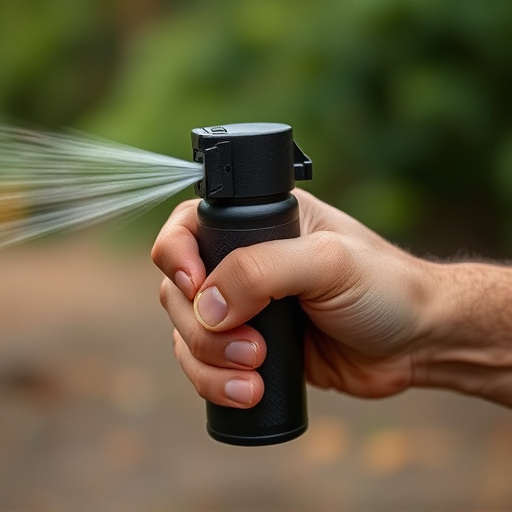Treating pets exposed to pepper spray requires immediate action: rinse affected areas with water for 15 minutes, provide a calm environment, and monitor for irritation. Consult a veterinarian if breathing difficulties or severe reactions occur. Proper cleaning prevents further discomfort and potential infections, while securing pepper spray and enrolling in animal first aid courses enhance emergency preparedness.
“In today’s world, civilian-grade pepper defense spray has become a common tool for personal safety. However, its potential impact on pets is a concern for many owners. This article delves into the science behind pepper spray, exploring its composition and effects on animals, particularly pets. We provide practical guidance on treating and caring for pets exposed to pepper spray, along with preventative measures to keep your furry companions safe from these incidents. Understanding these strategies can ensure your pets’ well-being in unexpected situations.”
- Understanding Pepper Spray: Composition and Effects on Pets
- Treating and Caring for Pet Exposure to Pepper Spray
- Preventative Measures: Protecting Your Pets from Pepper Spray Incidents
Understanding Pepper Spray: Composition and Effects on Pets
Pepper spray, a popular self-defense tool for civilians, contains capsaicin, the same compound that makes chili peppers spicy. This chemical irritates the eyes, nose, and respiratory system, causing temporary blindness, coughing, and difficulty breathing. While effective against potential attackers, pepper spray can also have unintended consequences when pets are exposed.
Treating pets exposed to pepper spray requires immediate action. Rinse the affected area with plenty of water for at least 15 minutes to dilute the capsaicin. If your pet is having trouble breathing or experiences severe irritation, seek veterinary care promptly. Provide a calm and quiet environment, as the stress can exacerbate the symptoms. Some pets may experience temporary sensitivity to light, so keep them in a dark space until the effects subside. Regular monitoring and cleaning of affected areas are crucial to prevent further discomfort or infection.
Treating and Caring for Pet Exposure to Pepper Spray
If your pet is exposed to civilian-grade pepper spray, it’s crucial to act swiftly and carefully. The first step is to remove any contaminated clothing or bedding immediately to prevent further irritation. Rinse the affected area thoroughly with cool water for at least 15 minutes, ensuring that no residual spray remains.
Treating pets exposed to pepper spray involves soothing care and close monitoring. Apply a mild, pH-balanced shampoo to gently clean the fur, then rinse again to remove any soap residue. Keep your pet calm and comfortable, providing access to fresh water and a quiet space. If irritation persists or worsens, consult a veterinarian for further guidance. Remember, swift action and proper care can significantly aid in minimizing discomfort and ensuring a full recovery for your furry companion.
Preventative Measures: Protecting Your Pets from Pepper Spray Incidents
If your pet is ever exposed to civilian-grade pepper spray, it’s crucial to act swiftly and appropriately to treat them. First, move your pet to a well-ventilated area to prevent further inhalation of the irritant. Then, immediately rinse their eyes with clean water for at least 15 minutes, ensuring the solution reaches all corners of the eye. This can help dilute the pepper spray’s effects and prevent long-term damage.
In addition to immediate treatment, there are preventative measures you can take. Keep pepper spray out of reach, storing it securely in a locked cabinet or safe. Regularly review and reinforce safety protocols with your pets, especially if they have access to outdoor areas where such incidents could occur. Additionally, consider enrolling them in first aid courses designed for animals to ensure they receive prompt and effective treatment during emergencies.
Pepper spray, while effective as a civilian defense tool, can pose significant risks to pets if they are exposed. Understanding its composition and effects is crucial for treating and caring for affected animals. By taking preventative measures, such as proper storage and use, and having an emergency plan in place, pet owners can minimize the risk of incidents. Prompt action and knowledge of treatment methods are essential when pets are exposed, ensuring their safety and well-being.
